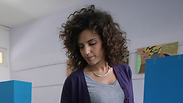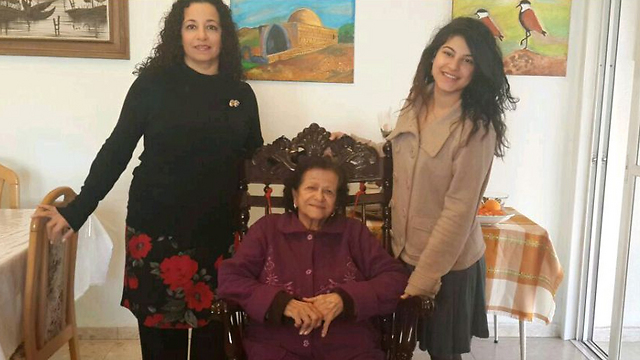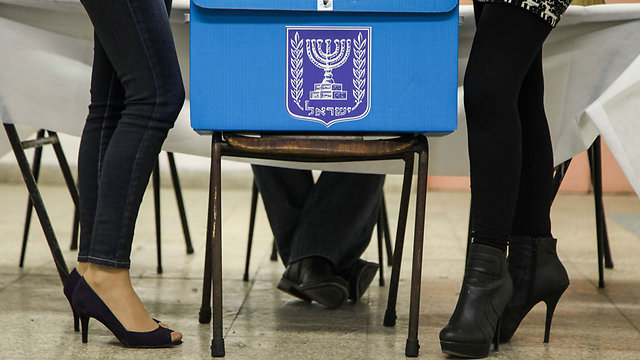
Casting the vote
צילום: ירון ברנר
Female representation not decisive factor in election, says poll
While a record number of women served in the most recent Knesset, 29 percent of women voters say Knesset representation will affect their vote, while 53 percent likely to vote for party supporting 'gender issues'.
Twenty-seven women served as MKs in the outgoing Knesset - a record number - and it seems like parties went out of their way to reserve spots for women on their lists for the 2015 elections in an attempt to appeal to the "female vote." But how would that affect the way women vote on March 17?

In a poll recently conducted by Na'amat (Movement for the Advancement of the Status of Women), 29 percent of women said that a proper representation of women in a party will increase the chance they will vote for that party (compared to 22 percent of men).
The survey also found that 53 percent of women will be inclined to vote for parties that promoted issues defined as "gender issues" – such as narrowing the wage gaps between women and men, subsidizing daycare, extending paid maternity leave and other issues - compared to 44 percent of men.
"I think there is no such thing as a female agenda," insisted Anat, 26, a student of education from Jerusalem. "Domestic violence, for that matter, affects men and children as well, and I think it needs to be important to everyone. Even if I need to choose between a party that does put an emphasis on that compared to one that doesn't address it at all, it will affect (my vote) - but in my opinion the socio-economic issue is the most important issue, in which women are also discriminated against and taken advantage of."
"When I look at issues like violence against women, maternity leave, and so forth, they're more important to me than defense, but not what's going to make me cast a ballot for a certain party," Anat went on to say. "There's also no specific woman politician who will make me vote for her. Even the work of certain female MKs on women's issues, regardless of how successful it is, will not make me vote for a certain party that I don't think is an option."
Tzlil Kapash, 18, who will vote for the first time in the upcoming elections, agrees: "As a child of divorce, the issue of single mothers is very important to me on a day-to-day level and it's important to me that they get more benefits. Even if it plays a part in influencing me on Election Day, it won't be to a point in which I'll vote for a leftwing party. I'd rather go to the right side of the political spectrum. In my opinion, some issues are paramount, like Greater Israel. Even if an all-woman party was formed vowing to deal only with women's issues, I wouldn't vote for it."

Tzlil Kapash with grandmother, Rachel, and mother, Limor. They say female representation would not change their vote
Majority of women won't necessarily lead to a change
Other women in Tzlil's family also believe female representation in a party is not the main consideration. "It doesn't matter to me if there's a man or a woman at the head of the party, as long as it's an honest person," Tzlil's grandmother Rachel Amir, 81, says. "I think there aren't enough women, but there are things that have changed a bit this year."
Tzlil's mother, Limor, also admits that "it's an ego boost to have women who are successful and reach high positions, but the number of women in a party is not what would make me vote for it."
Throughout the years, the ranks of female MKs have increased. The first Knesset had only 11 women, while the 19th, the latest, boasted 27 women. Among the new female candidates who will probably join the 20th Knesset are Attorney Revital Swid (Zionist Union), journalist Ksenia Svetlova (Zionist Union), deputy Jerusalem mayor Rachel Azaria (Kulanu), Arad mayor Tali Ploskov (Kulanu), Dr. Anat Berko (Likud) and Nava Boker (Likud).
"This election is a form of upset - there have never been so many women placed in realistic spots," says Prof. Anat First, a lecturer at the School of Communication of the Netanya Academic College. At the same time, she adds, "you need to make a distinction between two types of female MKs: MKs who represent women's issues and interests, and MKs who represent the population at large and copy the male agenda."
"The fact there are a lot of women does not guarantee that there will be a dramatic change in the chauvinist perceptions Israeli society is still afflicted with," Prof. First notes. "Our society is very patriarchal, and as long as we're a country in which security plays the central role - this issue won't be resolved."
Plan to narrow gaps and combat violence still needed
The 20th Knesset won't lack for issues to deal with. "For years there's been stagnation in all that systems that deal with domestic violence," offers Rivka Neumann, the head of the Department for the Advancement of the Status of Women at the Women's International Zionist Organization (WIZO). "The scope of services is not suited to the number of families that need treatment every year, and the number of warrants being violated without any enforcement from those supposed to protect women is unforgivable.
"Meanwhile, 200,000 women are being beaten, 15 women are murdered on average every year, and 65 cases are opened with the police every day, with lenient judges presiding over it all," Neumann continues. "Without a multi-systemic and thorough treatment of violence against women, women will keep being murdered. It's time to stop turning a blind eye - this phenomenon is not going to disappear on its own."
Dr. Galit Deshe, who up until recently was the executive director of the Women's Lobby in Israel, chooses to place the emphasis elsewhere: "The most challenging issue the next government will face is the decision made by the previous government to promote gender equality and implement gender thinking. Women's status in the employment market has been weakened over the past few years, with wage gaps at 17-35 percent. These gaps haven't narrowed in accordance with the rise in the number of women in management positions."
According to Dr. Deshe, "women are at the bottom of the pay ladder and positions in both public and private service, and are forced to work part-time jobs because of the double roles women play at the home and in the family. In addition, the perception of women's status in family law in Israel is flawed as it is based on religious and patriarchal law that discriminates women and defines them as the property of men. Even on the issue of protecting sexual assault victims and victims of human trafficking there is no organized national plan with goals and far-reaching targets."
On the one hand, women's organizations view the criticism the Likud party recieved for its low representation of women as a positive thing. "For many years, women were not treated as a distinct political group, and there was very little attention given to their needs and inclinations during election time," Na'amat President Galia Wolloch says. "It appears that in this campaign there's recognition of the importance and potential of the influence of the 'female voice' on results."
On the other hand, haredi parties did not include women on their Knesset list this year either, which raises the question of where the female haredi voice will go. Ruth Colian, the head of haredi female party 'B'Zhutan, believes she'll be able to get votes from the women in the haredi sector. "Haredi MKs allow themselves not to show up to votes on bill proposals to give stipends to housewives, and their blatant disrespect when it comes to women's issues led us to realize there's no one to take care of us. There's a fear among women voters, but I believe haredi women will secretly vote for us."
Noam (Dabul) Dvir contributed to this report.











